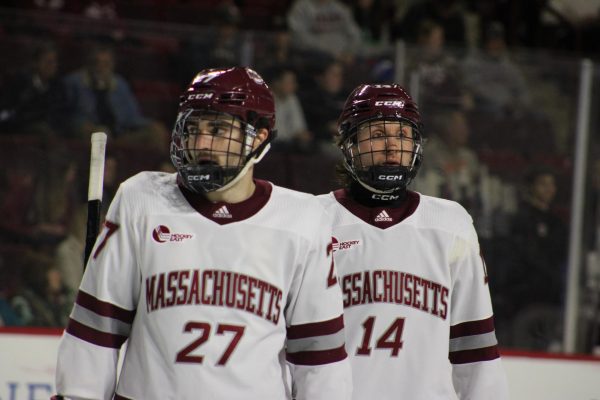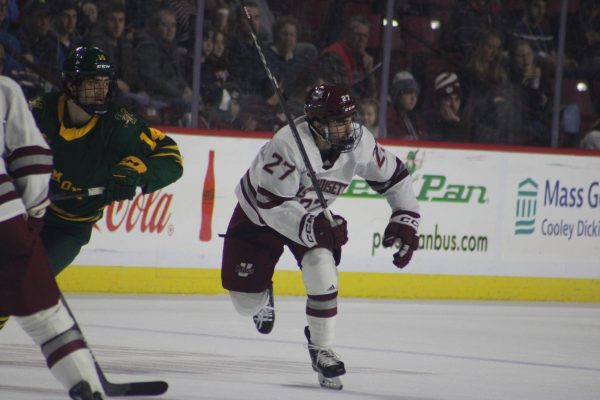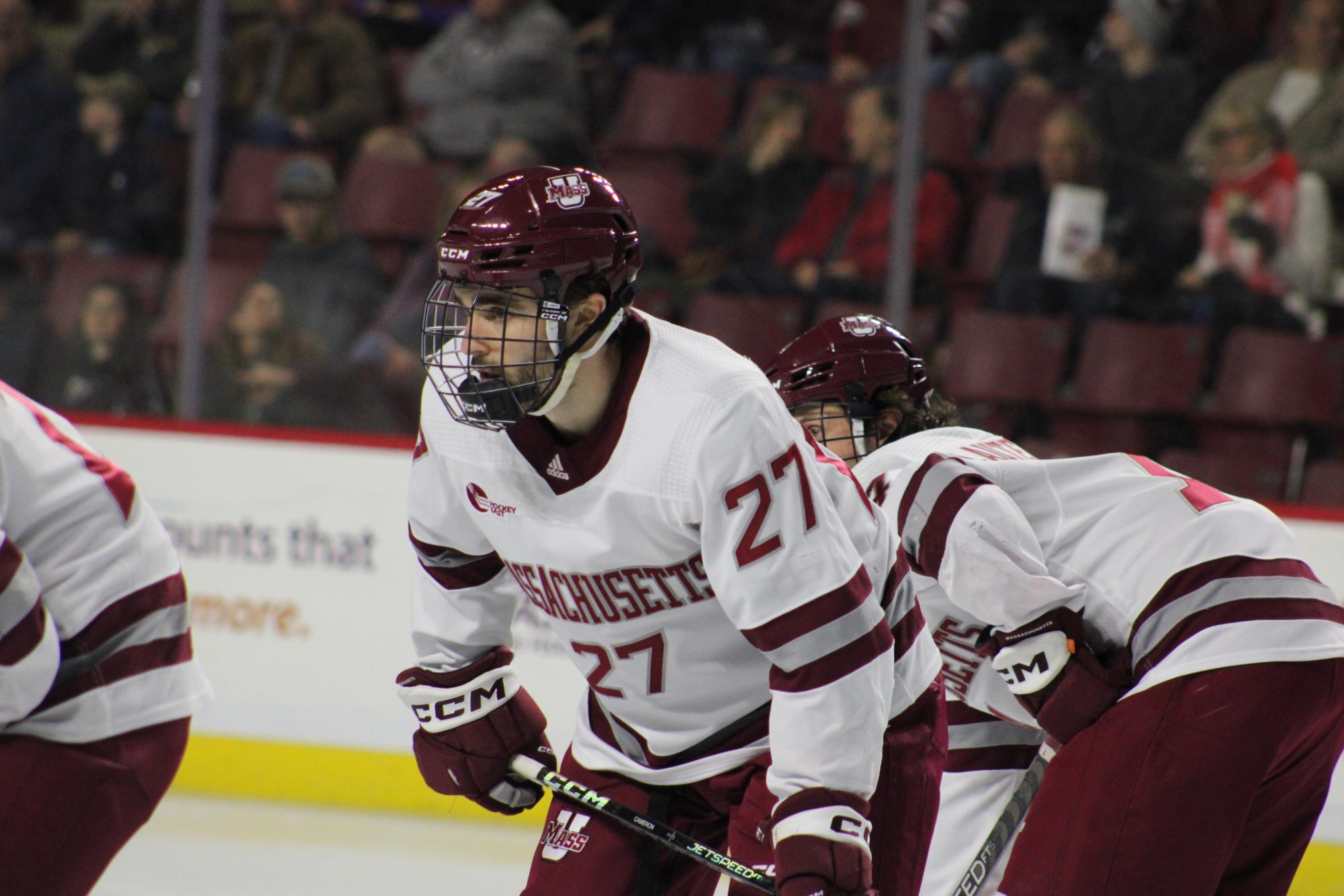11-year-old Michael Cameron sat in his local doctor’s office after he lost weight due to what he thought was a stomach bug.
His parents, Jeff and Shelly Cameron were under the impression that the visit to the doctor’s office would just be a trip for medicine and to get an official diagnosis. What they didn’t know was that Michael would be transferred from his local doctor’s office in Berwyn, Pennsylvania to the Children’s Hospital of Philadelphia after they learned that his blood sugar was in the 500’s, when it should have been in the 80-120 range. What was thought to just be the flu turned into a diagnosis of type one diabetes and a three-day stay in the hospital.
“At first, I was terrified,” Michael said.
Type one diabetes did not run in either of Jeff or Shelly’s families, so the diagnosis came out of the blue. The two didn’t know a lot about the chronic disease, leading them to explore a new chapter of their lives.
While they were most concerned about Michael’s health, they also worried about how diabetes could affect his extracurriculars. He played a number of sports outside of hockey, including baseball and lacrosse at the time.
“It was just a complete blur for us,” Jeff said. “We just thought there was just maybe a bug or a virus, to inundated in the hospital for three days, just learning what type one diabetes is, and how we had to manage it, and how to give yourself injections and how to count your carbs before your meals.”
Shelly, Jeff and Michael quickly adapted. Shelly led the effort in learning how to help manage his diabetes in his daily life and also when playing sports.

With the help of his mom, Michael learned to manage his blood sugar levels. Shelly, as Michael transitioned into living on his own in Salisbury, Omaha and Amherst, has tried to stay in the loop with how Michael is managing his blood sugar. She was not afraid to go up to Massachusetts hockey team head coach Greg Carvel herself to make sure Michael would be comfortable in his new home in Amherst.
Carvel, when confronted by Shelly about if her son would be in a good place at UMass, gave her a simple answer.
“I just remember telling her ‘you can sleep easy, we’re here to look after him and take care of him’,” Carvel said.
Despite Carvel not having the experience that Michael’s parents have had, he can relate to the worry a parent can have when their child is away. While he has had parents come to him before and make jokes about taking care of their kids, this was the first time a parent was not afraid to have a serious conversation about their son’s health.
“We build an environment of trust and it’s a safe environment to be vulnerable, to be honest and that extends to medical issues,” Carvel said. “Michael’s done really well and his mom’s still nice to me, so I think we’re doing a good job.”
The family also had to deal with the task of helping the people around them learn about diabetes. There are two variations of diabetes, type one and type two. When Michael was first diagnosed, the family informed the people around them of the difference.
Type one diabetes doesn’t create limitations on what someone can eat while type two does create a limit.
“People [were] worried about what he could eat or what he could drink,” Jeff said. “I think they associate type two diabetes with type one.”
Always learning, Michael continued to play sports and manage his blood sugar levels at a young age.
In eleventh grade, Michael moved away from home for the first time to go to the Salisbury School, a boarding school in Connecticut. While the experience was his first taste of living without his family, it was also his first taste of managing his diabetes without help.
“There was a nursing staff there so I would check in with them a lot and that helped,” Michael said.
From then on, Michael always seemed to be moving around and away from his hometown in Pennsylvania. After leaving the Salisbury School, Michael moved to the Omaha Lancers of the United States Hockey League, over 1,100 miles away from Berwyn.
Michael’s billet family, the Distefino’s, welcomed him with open arms. While he was far away from home, the family quickly made him comfortable in his three-year home.
“They were awesome, anything I needed for diabetes, they were there for me and they helped me,” Michael said of his billet family. “They made it really easy for me to transition, I was really lucky.”
He embraced the new experience, maturing and learning how to manage everything by himself. Now that Michael is fully capable of controlling his diabetes on his own, he has found a way to channel what was a scary part of his life into something positive for others struggling with diabetes.
In his three years with the Lancers, Michael was a big part of the community, becoming a role model for children. Michael and the Cameron family started the Michael Cameron diabetic buddy of the game.
The buddy of the game started as an idea between Michael and his father. During Michael’s second season with the Lancers, he decided that he wanted to be more involved in the diabetic community. In a conversation with his dad, they talked about making an impact on the diabetic community locally in Omaha.
“You have a little bit of a platform playing junior hockey out [in Omaha] and there’s a lot of kids across the country that have diabetes,” Michael said.
His dad came up with the idea to give young children who were diagnosed with diabetes in the area tickets to games. During warmups, they sat on the bench, getting an up-close experience of players on the ice. After the game, Michael met with the children and their families. The children walked away with souvenirs from Michael and the experience of meeting an athlete going through the same experience as them.
“They look up to you,” Michael said. “I mean, there’s not many professional athletes that have diabetes. There’s starting to be more like Max Domi in the NHL and there’s Mark Andrews, tight end from [the Baltimore Ravens], he has diabetes.”
Parents would come up to the family after the game, thanking Michael and his family for what they were doing with the buddy of the game. What Michael did in Omaha motivated him to do the same in Amherst.
Michael is hoping in the coming year to figure out how to carry out a similar event at UMass.
“He brought the [Omaha] community together and he’s also done a lot of the same here at UMass,” former Omaha and current UMass teammate Kennedy O’Connor said.
Michael earned the 2022 Curt Hammer Award, an award that recognizes a USHL player who distinguishes themselves both on and off the ice by demonstrating outstanding skills, pride and determination.
Although he was coming into his own as an advocate for the diabetes community, Michael went through his own off-ice battles.
In his first year with the Lancers, Michael came in as a young player on an experienced team.. He struggled to make his way into the lineup, getting scratched for the majority of his first season with the team.
“Looking back on it, it made me mentally tougher and savor every shift,” Michael said.
As Michael started to figure out his role in Omaha, he dealt with injuries that took him out of the lineup for most of the season. In the USHL regular season, there are 62 games,and in that time Michael had three concussions. In the 2020-21 season, he only played 26 games, but he tried to see the positives.
His teammates and coaches were a big help in Michael staying motivated. The help they gave him built strong relationships, relationships he carries with him to this day.
“It all just taught me how to deal with adversity and make me stronger,” Michael said.

In his third and final year in Omaha, Michael stayed healthy and had a big year. He was named a captain and logged 36 points through 56 games. With the big season, he took the next step, going into his freshman year at UMass.
While Michael was not an immediate impact player, he still made the most of his first year. When he found his footing, he became an important piece in the Minutemen lineup. As just a freshman, he was tied for second on the team in goals with nine alongside Scott Morrow and Kenny Connors.
Now, in his sophomore year, despite being sidelined for two games with an injury, Michael is crucial to UMass. Although he may not always show up on the scoresheet, a difference is felt when number 27 isn’t skating on the ice.
“His speed is dynamic, and I think he found a lot of confidence in that he has that asset,” Carvel said. “I like our lineup a lot better when he’s in it.”
Despite not being the loudest guy in the locker room, a trait everyone around him knows, Michael has always been a silent leader. He may not speak up with his words, but Michael leads by example through his experiences and he carries that with him at the collegiate level.
“He’s a very mature person and a very quiet leader,” Jeff said. “He works very hard and he’s a great teammate. He plays the game the right way and he never cheats the game and I think that rubs off on teammates.”
While Michael has had off-ice battles throughout his life, he continues to excel and move up to higher levels of hockey. He has not only thrived as a hockey player, but has also become a role model for younger generations.
Kayla Gregoire can be reached at [email protected] and followed on Twitter @Kaygregoire.




















